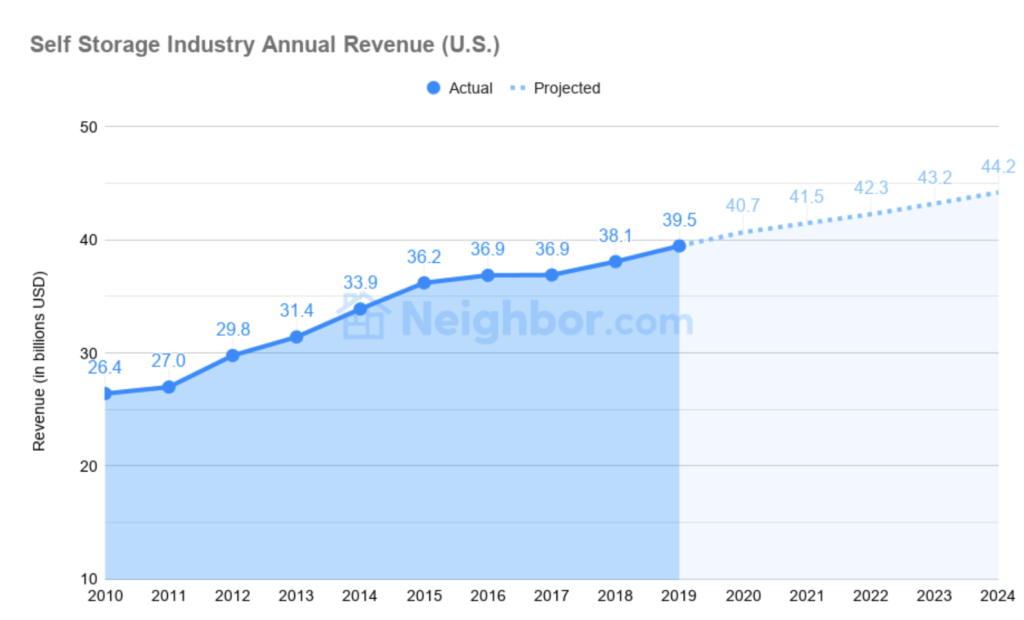12 min read
Beyond Traditional Loans: 14 Creative Financing Options for Real Estate Investing
Creative financing can offer real estate investors options beyond traditional lending from banks. If you have less-than-ideal credit or lack a sizeable...

Running a rental property management business makes independent landlords appreciate the little things that others might miss – like the joy of finding the perfect tenant or the satisfaction of marking off a maintenance checklist. Being a landlord also means knowing the unique value of space.
In fact, Americans value space so much that the U.S. self-storage industry’s annual revenue was $39.5 billion in 2019, which was a 3.6% year-over-year increase. Additionally, the self-storage industry’s profit margins are almost twice as high as the average profit margin for all industries.

And these figures are only expected to rise. As of 2017, almost 10% of all U.S. households rented a self-storage unit, and the average tenancy is 14 months.
But you don’t have to have an empty warehouse sitting around to cash in on this ever-growing vertical. This article will teach you everything you need to know about finding and renting out extra space around your rental unit(s) to pad your bottom line.
To maximize your potential revenue boost, it’s important to be strategic about the extra space you rent out. If you plan to rent out an area that your current tenants use or to which they have access, let them know. Provide plenty of notice for them so they can move their belongings as needed.
From there, decide what kind of space you have to share. Some examples include a(n):
If extra space doesn’t immediately come to mind, drop by your vacant unit(s) and/or schedule a walkthrough with your tenant to take stock. Write down the general dimensions of each space in addition to any extra details that may make it appealing.
Once you know what kind of space you have available, Neighbor makes it simple to start the rental process. In fact, it only takes a few easy steps:
1) List your spaces. Describe your available space(s) with Neighbor and answer their questions about how much you’d like to earn.
2) Respond to renters. Receive renter requests that detail what they want to store and when, then approve them.
3) Schedule a move-in. Set up a time for your renter to move in.
Neighbor puts you in full control of the process, meaning you get to decide when and how renters use your space. All you need to do is clear a space, list it with Neighbor, and your newest revenue stream will be ready to go.
Forget about the hassle of paperwork or tracking down payments: their terms of service has you covered, and they automatically deposit monthly rent into your account each month. If your renter doesn’t pay, Neighbor will – meaning your financial risk drops significantly. To further ease your mind, Neighbor offers hosts like you $1,000,000 in free coverage while making property protection plans available for your renters.
Not convinced yet? Below are the answers to the most frequently asked questions to help you understand everything Neighbor has to offer.
Hosts earn an average of $100-$400 per month by listing their unused space with Neighbor.
Hosts don’t pay to list their spaces on Neighbor! Instead, a processing fee of 4.9% + $0.30 is withdrawn from each monthly payout. This fee allows Neighbor to manage payments, resolve issues, and provide world-class customer service, among additional perks. Hosts receive payments through their bank account using Stripe. Stripe is an encrypted, PCI-compliant server used by 100,000+ vendors worldwide – including TurboTenant!
Renters pay a service fee and monthly rent via their credit cards.
Everyone can be a Neighbor – their community isn’t limited to any city or state! If you want to open a new passive income stream by becoming a host but don’t see many local renters, publish your listing anyway and promote it on your social media platforms. It’s more than likely that someone you know might need a new storage option.
Renters are prohibited from living or working inside Neighbor’s storage spaces; listings on their platform are meant for storing items only, which means you don’t have to worry about your property getting damaged. If something unusual happens, Neighbor’s $1,000,000 Host Guarantee will protect your space.
Hosting with Neighbor is the smart choice for independent landlords looking to make the most of their rental property. By listing your street parking, garage space, unused room, industrial lot, shed, or any other available space, you have the opportunity to earn passive income without having to lift another finger. Neighbor will take care of the payments, including missed payments from renters as needed, and their $1,000,000 Host Guarantee protects your assets against the unexpected.
12 min read
Creative financing can offer real estate investors options beyond traditional lending from banks. If you have less-than-ideal credit or lack a sizeable...
11 min read
If you came here wondering how to write a lease agreement, look no further. Creating iron-clad rental contracts is essential for protecting the rights...
10 min read
Between the risks of running a business, a volatile and ever-changing real estate market, and the sometimes fickle attitudes of the renting...
Join the 700,000+ independent landlords who rely on TurboTenant to create welcoming rental experiences.
No tricks or trials to worry about. So what’s the harm? Try it today!
TurboTenant, Inc., © 2025
Created in Sunny Colorado